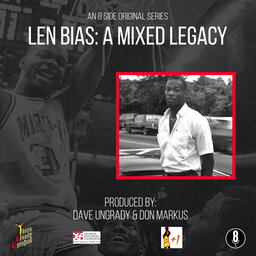Ep 1 - Len Bias: A Mixed Legacy | The Introduction
Who was Len Bias? Why is his legacy so important? In this episode, we answer those questions. With insight from Clark Kellogg of CBS Sports and Justin Tinsley of ESPN, and the Undefeated, and others. Also what to expect in this podcast series.
 Len Bias: A Mixed Legacy
Len Bias: A Mixed Legacy


